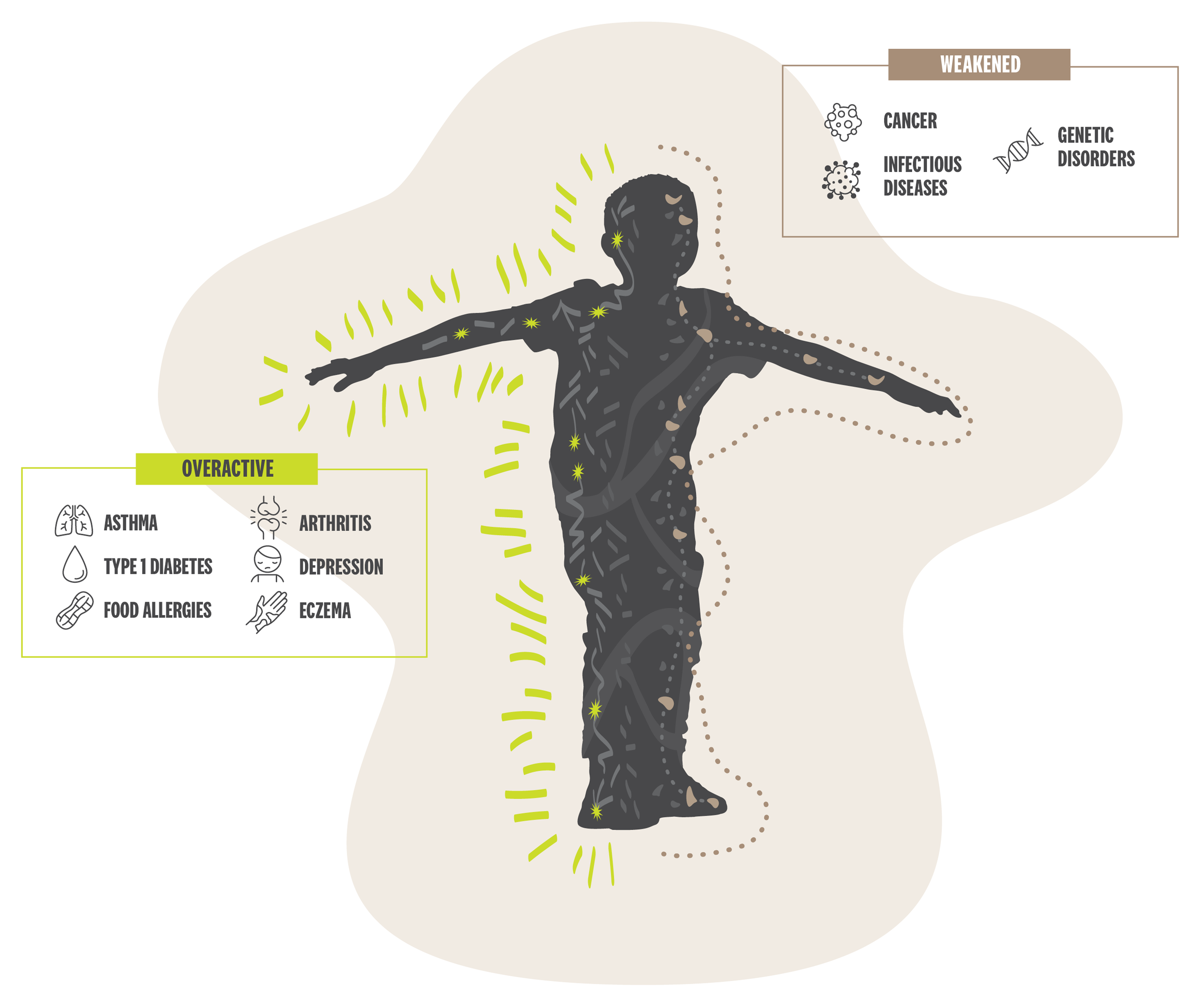Inside the quest to unravel the mysterious world of the immune system

Think about your immune system for a moment. You might envision an internal defense system that protects you from common illnesses like the cold and flu. That’s, of course, true— the immune system is constantly on the lookout for invading germs, bacteria and other organisms. Yet, that doesn’t even begin to scratch the surface of its importance.
Along with fighting infections, the immune system performs many beneficial functions—like guarding against cancer cells and helping to repair damaged tissues. However, it also has a shadowy side. When not functioning properly, it can lead to the development of chronic conditions such as diabetes, asthma and celiac disease. And a growing body of research has linked it to mental health issues like depression.
In short: the immune system is inextricably intertwined to virtually every aspect of our health, whether good or bad.
DEMYSTIFYING THE IMMUNE SYSTEM
Despite its significance, the immune system has long been shrouded in mystery—considered second only to the brain in complexity. That’s partly because it isn’t tied to a specific organ, such as the heart or lungs. This vast network of cells, tissues and organs can be found virtually everywhere within our body, from our toes to our head. And that means there are a multitude of ways that it can impact a child’s health.
While we are only beginning to understand these connections, one thing is clear: this knowledge will revolutionize how we treat the biggest health challenges facing children. Led by Dr. Kyla Hildebrand, a dedicated team of clinical immunologists—including Drs. Catherine Biggs, Elliot James and Stuart Turvey—assess children each year at BC Children’s Hospital. Their expertise isn’t only sought after by clinicians across the hospital seeking to diagnose perplexing conditions; it’s also garnered international attention, with children’s hospitals around the world turning to the team to answer tough questions.
“Our patients live with rare conditions,” explained Dr. Hildebrand. “Some children do not yet have specific diagnoses and our team is working to discover novel genes that may allow for precision treatments and therapies.”
Although their influence is already significant, their aspirations for the future are even bolder: they are determined to connect the dots that link the immune system to a host of other conditions, from atopic disorders to immune dysregulation.

“We’re working to launch a bold new precision immunology initiative, where we’re bringing experts across the campus together in new ways to understand the immune system’s role in different childhood diseases and ultimately ensure every child has the best immune system possible to fight big health challenges.” — Dr. Manish Sadarangani, Director of the Vaccine Evaluation Center
AN OVERACTIVE IMMUNE SYSTEM
The immune system is important for keeping us healthy and fending off infectious diseases, but it can also cause serious health issues when it goes awry. For some children, it can be too aggressive and cause conditions like asthma, eczema and food allergies. This occurs when the immune system mistakenly recognizes a harmless substance, such as pollen or peanuts, as a threat and carries out a full-blown attack against what it considers to be an invader. In other children, the immune system accidentally views the body as the enemy and attacks the very cells it exists to protect, leading to autoimmune conditions like inflammatory bowel disease.
Many current treatments for these conditions suppress the entire immune system, which leave children vulnerable to serious infections and other severe side effects. Determined to develop a better way, researchers at BC Children’s are racing toward a future where kids receive highly tailored treatments that fight only the cells that act out of line, sparing all healthy ones. Achieving this will require that they first gain a comprehensive understanding of every child’s immune system.
Dr. Megan Levings, Director of the Childhood Diseases Research Theme and Investigator at BC Children’s Hospital Research Institute, explains that this research will allow for the development of truly personalized treatment plans. “A precise understanding of a child’s immune system will enable us to pinpoint the exact biological pathways and cells causing trouble,” said Dr. Levings. “We can then select the most effective treatments that fix those challenges in a highly individualized, patient-specific manner.”

A WEAKENED IMMUNE SYSTEM
On the other hand, children may also have a weakened immune system, either due to genetic conditions, diseases or treatments that suppress immunity. Take childhood cancer, for example. It’s estimated that hundreds of cancer cells are eliminated by immune cells every single day. Still, some cunning cells manage to successfully dodge detection by disguising themselves as healthy ones.
Conventional treatments, such as chemotherapy, attack both cancer cells and healthy cells that fight infections. While pediatric oncologists strive to develop treatment plans that strike a careful balance between eradicating a child’s cancer and minimizing the harm it causes, 75% of kids experience life-long side effects from treatments.
Through cellular therapy, researchers at BC Children’s Hospital are now training the immune cells to fight back against disease. The process involves extracting a patient’s cells, modifying them in the laboratory and reinjecting them into the patient’s body, where they divide and attack cancerous cells with remarkable precision. Not only can this reduce the side effects of chemotherapy, but it also has the power to prevent future relapses as the manipulated cells continue to live in the body.
Cell therapy also holds promise for a range of conditions beyond cancers. For instance, children who have undergone heart or kidney transplants must currently take immunosuppressants that suppress the immune system, ensuring that it doesn’t recognize the organ as foreign and begin to attack it. But what happens if they develop a severe viral infection? In some cases, they may need to temporarily stop taking these powerful medications to fight the virus. Although it’s still in its early days, researchers are exploring the potential of injecting immune cells that could eliminate the virus, so kids could continue immunosuppressants.
“For years, cellular therapy seemed like a distant dream,” said Dr. Levings. “Now, it’s becoming a reality, especially in the fight against cancer. We’re also on the cusp of applying this groundbreaking therapy to a wide range of autoimmune and transplant-related diseases.

DEEPER INTO THE IMMUNE SYSTEM’S DEPTHS
The immune system is truly extraordinary. As one of the most sophisticated systems in the body, its 1.8 trillion cells work together to protect children from not only infectious diseases but also countless other health threats in ways we’re only beginning to comprehend. Through their bold efforts to untangle these many connections, visionary medical minds at BC Children’s are poised to transform how some of the toughest health challenges are confronted.
The immune system plays a crucial role in a child’s overall health.
1.8 trillion cells make up the immune system
The immune system remembers an enemy for decades
80+ illnesses result from the immune system attacking the body
20+ diseases are prevented by vaccines that boost the immune system
